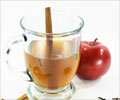Cornell University researchers have ascribed another use to the apple. This time it is the fruit's peel that may prove useful in preventing cancer.
Cornell University researchers have ascribed another use to the apple. This time it is the fruit's peel that may prove useful in preventing cancer
Rui Hai Liu, Cornell's Associate Professor of Food Science, has identified a dozen compounds called Triterpenoids in an apple peel that either inhibit or kill cancer cells during laboratory cultures."We found that several compounds have potent anti-proliferative activities against human liver, colon and breast cancer cells and may be partially responsible for the anti-cancer activities of whole apples," said Liu, who is affiliated with Cornell's Institute of Comparative and Environmental Toxicology and is the senior author of the study.
In earlier studies, apples had been found not only to fight cancer cells in the laboratory, but also to reduce the number and size of mammary tumours in rats. But now, Cornell researchers think that the Triterpenoids may be doing much of the anti-cancer work.
"Some compounds were more potent and acted differently against the various cancer cell lines, but they all show very potent anti-cancer activities and should be studied further," said Liu.
In the study, the research team analyzed the peel from 230 pounds of red delicious apples from the Cornell orchard and isolated their individual compounds. After identifying the structures of the promising compounds in the peel, the researchers tested the pure compounds against cancer cell growth in the laboratory.
"We believe that a recommendation that consumers to eat five to twelve servings of a wide variety of fruits and vegetables daily is appropriate to reduce the risks of chronic diseases, including cancer, and to meet nutrient requirements for optimum health," said Liu.
Advertisement
Source-Medindia
RAS/L







